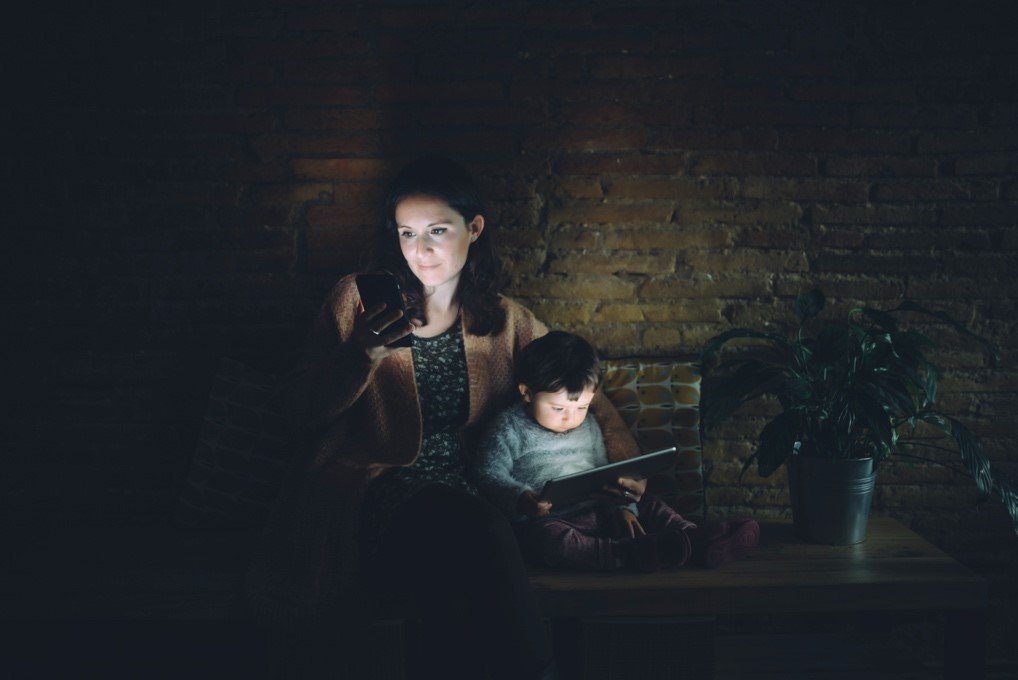Digital Pacifiers: Does Media Help or Hinder Infants?
By Claire McDavid
One of my fondest childhood memories was pitching up a pink Barbie tent in my living room and putting blankets and sleeping bags inside, then setting up our tiny VHS TV and popping in the movie Aladdin. Now, kids have the entire web at their fingertips, sometimes with parental controls, sometimes without. A child can access hundreds of different shows through Netflix, hundreds of different apps through the app store, and anything on the internet that they would want to search for. How is this media exposure affecting our children today? The internet has become the backbone of our society in many ways, but is this going to be a problem for our youth growing up in the age of technology?
Infant media access
Exposure to media begins earlier than we may think with parents exposing their children to media as early as six months old or younger. In a study conducted by Tomopoulos et. al (2010), 259 mothers reported exposing their children to 152 minutes of screen time per day on average. That’s roughly two and a half hours that these six-month-old babies are spending each day watching media on a screen. It’s understandable that parents need a break sometimes and need to find something for their infant to do, however, screen time is not the answer. A study conducted by Zimmerman et. al (2007) found a negative correlation between infant exposure to media and language development; that is, as exposure to media went up, reported language development went down. Specifically, for every hour an infant, between 8-16 months, watched media they lost 6-8 words of their vocabulary. For the parents in the first study, that means their children lose 15-20 words of their vocabulary per day by being exposed to media. Now certainly there are other variables involved in creating vocabulary like how much caregivers talk to their children and how much a child is read to. It may be possible that these types of positive behaviors could cancel out negative effects of media.
Educational media
What about media that’s educational? Good question! Researchers have found that educational media does not appear to have any significant benefits. DeLoache et. al (2010), sought out to answer the question, ‘Do babies learn from baby media?’. They tested 12 to 18-month-olds by having them view educational videos for four weeks and assessing any knowledge gained. DeLoache et. al found that the infants did not learn anything new from the videos, nor did they lose any of their prior knowledge. Interestingly though, the study found that infants who were not exposed to any media but were instead taught words during everyday activities learned significantly more words.
American Academy of Pediatrics
The American Academy of Pediatrics (AAP) suggests limiting screen time for infants under 18 months, and if possible, to not give them screen time at all. As an assistant teacher in childcare, I’ve experienced how formative the first five years are in a child’s life. Infants grow so quickly and need to experience different stimuli. Other ways of providing this stimulation could be allowing the infant to play with infant toys that stimulate different senses such as colors, lights, sounds, movement, and touch. Try exposing infants to their own surroundings. For example take a baby, who can sit up comfortably, outside in the grass. Let them enjoy sensory experiences like the smell and feel of the grass near their body. Don’t forget to monitor them closely to assure they don’t eat the grass, because trust me, they will try! The AAP absolutely recommends parents have strategies in place to take breaks. Good alternatives to media could be: laying the baby down for a nap, soliciting the help of friends and relatives to watch the baby, or putting their child in a safe play structure for a bit.
Conclusion
Although it is common and easy to allow children to use media, I think it is crucial that parents understand the possible negative effects of doing so. Media usage can delay language development in infants and prevents them from exploring and interacting with their environment. Educational materials that are put on television aren’t as helpful as being engaged in real life. I understand the need to give children something to keep them occupied while their caretaker is attending to other things, however, it is important to know that media is not always the appropriate tool to occupy young children. As we continue to grow into a more connected technological society, the effects of media and technology surrounding children will have to be further studied and monitored to assure we are providing a healthy environment for our youth.
References
DeLoache, J. S., Chiong, C., Sherman, K., Islam, N., Vanderborght, M., Troseth, G. L., Strouse, G. A., & O’Doherty, K. (2010). Do Babies Learn From Baby Media? Psychological Science, 21(11), 1570–1574. https://doi.org/10.1177/0956797610384145
Screen Time and Children (2020, February). In American Academy of Child and Adolescent Psychiatry. https://www.aacap.org/AACAP/Families_and_Youth/Facts_for_Families/FFF-Guide/Children-And-Watching-TV-054.aspx
Shaw, J. (2016). Memory Illusion (pp. 147-149). Random House. https://libro.eb20.net/Reader/rdr.aspx?b=2524325
Tomopoulos, S., Dreyer, B. P., Berkule, S., Fierman, A. H., Brockmeyer, C., & Mendelsohn, A. L. (2010). Infant media exposure and toddler development. Archives of pediatrics & adolescent medicine, 164(12), 1105–1111. https://doi.org/10.1001/archpediatrics.2010.235
Zimmerman FJ, Christakis DA, Meltzoff AN. Associations between media viewing and language development in children under age 2 years. J Pediatr. 2007 Oct;151(4):364-8. doi: 10.1016/j.jpeds.2007.04.071. Epub 2007 Aug 7. PMID: 17889070.

